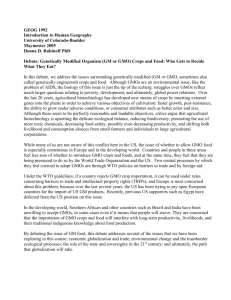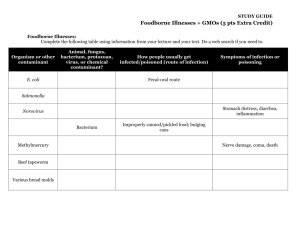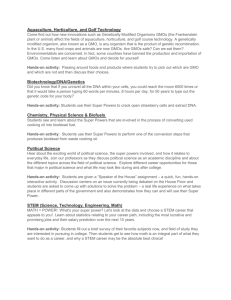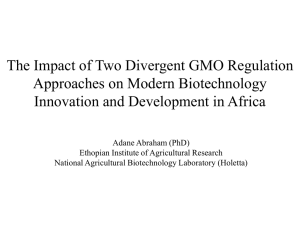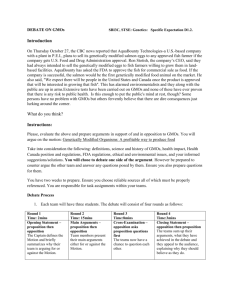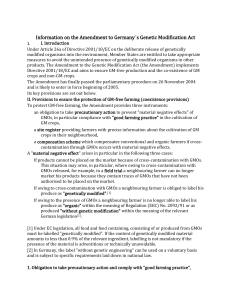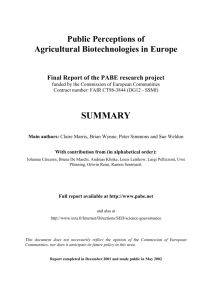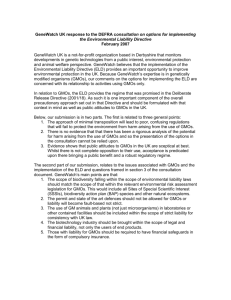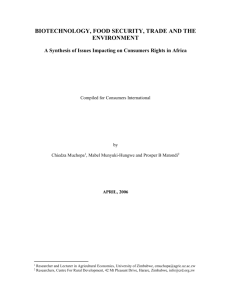Draft Submission on the Older Person`s Bill (B 68B – 2003)
advertisement
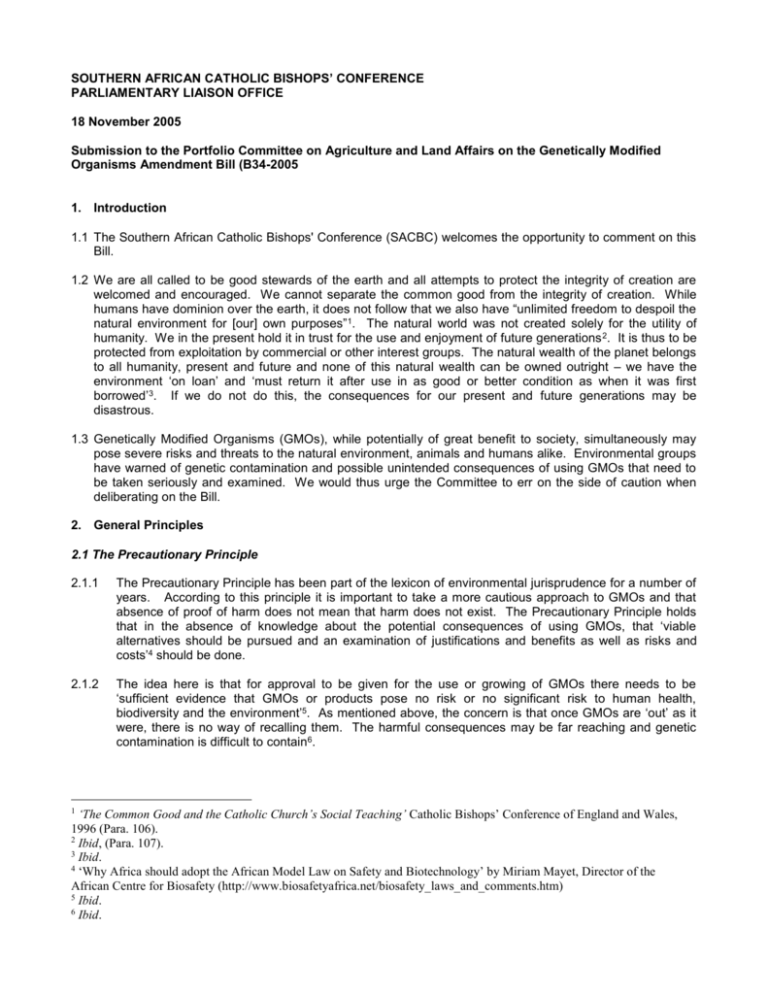
SOUTHERN AFRICAN CATHOLIC BISHOPS’ CONFERENCE PARLIAMENTARY LIAISON OFFICE 18 November 2005 Submission to the Portfolio Committee on Agriculture and Land Affairs on the Genetically Modified Organisms Amendment Bill (B34-2005 1. Introduction 1.1 The Southern African Catholic Bishops' Conference (SACBC) welcomes the opportunity to comment on this Bill. 1.2 We are all called to be good stewards of the earth and all attempts to protect the integrity of creation are welcomed and encouraged. We cannot separate the common good from the integrity of creation. While humans have dominion over the earth, it does not follow that we also have “unlimited freedom to despoil the natural environment for [our] own purposes”1. The natural world was not created solely for the utility of humanity. We in the present hold it in trust for the use and enjoyment of future generations 2. It is thus to be protected from exploitation by commercial or other interest groups. The natural wealth of the planet belongs to all humanity, present and future and none of this natural wealth can be owned outright – we have the environment ‘on loan’ and ‘must return it after use in as good or better condition as when it was first borrowed’3. If we do not do this, the consequences for our present and future generations may be disastrous. 1.3 Genetically Modified Organisms (GMOs), while potentially of great benefit to society, simultaneously may pose severe risks and threats to the natural environment, animals and humans alike. Environmental groups have warned of genetic contamination and possible unintended consequences of using GMOs that need to be taken seriously and examined. We would thus urge the Committee to err on the side of caution when deliberating on the Bill. 2. General Principles 2.1 The Precautionary Principle 2.1.1 The Precautionary Principle has been part of the lexicon of environmental jurisprudence for a number of years. According to this principle it is important to take a more cautious approach to GMOs and that absence of proof of harm does not mean that harm does not exist. The Precautionary Principle holds that in the absence of knowledge about the potential consequences of using GMOs, that ‘viable alternatives should be pursued and an examination of justifications and benefits as well as risks and costs’4 should be done. 2.1.2 The idea here is that for approval to be given for the use or growing of GMOs there needs to be ‘sufficient evidence that GMOs or products pose no risk or no significant risk to human health, biodiversity and the environment’5. As mentioned above, the concern is that once GMOs are ‘out’ as it were, there is no way of recalling them. The harmful consequences may be far reaching and genetic contamination is difficult to contain6. ‘The Common Good and the Catholic Church’s Social Teaching’ Catholic Bishops’ Conference of England and Wales, 1996 (Para. 106). 2 Ibid, (Para. 107). 3 Ibid. 4 ‘Why Africa should adopt the African Model Law on Safety and Biotechnology’ by Miriam Mayet, Director of the African Centre for Biosafety (http://www.biosafetyafrica.net/biosafety_laws_and_comments.htm) 5 Ibid. 6 Ibid. 1 2.1.3 The Precautionary Principle is part of the Cartagena Protocol on Biosafety and includes the controversial area of GMOs given as aid. We would note with concern that some of the aid to southern Africa was genetically modified. As a signatory to the Protocol we would ask that the Committee consider putting into the legislation more stringent guidelines around the importation of food given in aid. 2.2 Access to Information/ Labelling 2.2.1 The Constitution and the Promotion of Access to Information Act guarantee the rights of citizens to information in South Africa. Since there are potential environmental and health implications relating to the use and consumption of GMOs it is vital that people are given adequate information to make informed decisions. In this regard labelling is of vital importance. We would thus urge the Committee to include mandatory disclosure on labels. 2.3 Promoting Public Participation 2.3.1 While the level of public input into the legislative process is welcomed there is some concern about the Executive Council. The Amendment Bill makes provision for the Executive Council to consult with the public, consider EIAs and examine the potential socio-economic impact of activities (clause 5 (2) (a) (i), (ii) and (iii)). This, however, is a discretionary power. 2.3.2 Since the area of GMOs touches on a number of important issues (health, the environment, access to information), we would propose that some mechanism is created so that the public is able to make a meaningful contribution at this level. 2.4 GMO Cost Analysis 2.4.1 Although GMO increases the yield per seed ratio, GM food is poorly suited to African farming. Traditionally which includes rural and commercial farming; South African farmers have saved their seeds to use for the following year. GMO does not allow for this which forces the farmer to buy seed every year. This creates a monopoly or at the very least a restricted control over food supply to GM seed producers. The results of an increase in GM foods in light of the costs may have wider consequences for the emergent farming sector. We would therefore ask this committee to consider promoting the emergent farming sector in the tabling of this bill. 2.4.2 Increased interest in GM Foods has the negative potential of stifling alternative sources of food. The Church supports all endeavors to increase the supply of food in order to eradicate poverty. The GM debate has led to a false dichotomy between GM and Non-GM Foods which has hidden some of the alternatives. For example sustainable farming has been largely ignored. It is imperative that alternative food sources are not undermined in the implementation of the GMO amendment bill. 2.4.3 Irrigation remains a problem for farmers in South Africa as we are plagued with regular droughts. GMO’s have been largely designed to decrease the impacts of weeds and pests. As such the level of drought resistance has not been significant. It is therefore unwise to pursue the use of GM when the supply of water to farmers remains erratic. The Bill must therefore consider the need and current use of water in order to make GM’s viable. 2.4.4 Most GM’s are modified through the addition of viral and bacterial genes into seeds. The implication of this to a country that has over 6 million people living with HIV/AIDS is naturally catastrophic. The cost of overcoming any health impacts of GM is not known and a precautionary approach is again necessary. In addition to this there is a contradiction between the biotech companies marketing of safety and their refusal as well as insurance companies’ refusal to take responsibility for GMO. 3. Conclusion 3.1 We support the government’s attempt to regulate GMOs. In our submission on the 2004 Amendment Bill, we pointed out the challenge that GMOs present to Africa. We are on a continent that is vulnerable to the conditionalities imposed by richer, more developed states. As regards GMOs, we need to be careful of rushing in where angels fear to tread, and to protect our citizens and environment from the potential harm of GMOs. In cautiously regulating the use of GMOs, we can reap the benefits that they may bring, while at the same time acting responsibly to ensure that greater harm is not bought on by hastily embracing GMOs without the necessary information. For more information, please contact Mr Kevin Roussel and Ms Felicity Harrison Researchers PO Box 2910 Cape Town 8000 South Africa 12 Bouquet Street Cape Town 8001 Tel: +27 (0)21 461 1417 Fax: +27 (0)21 461 6961 e-mail: info@cplo.org.za

